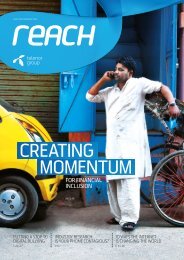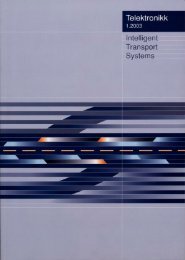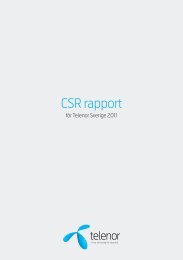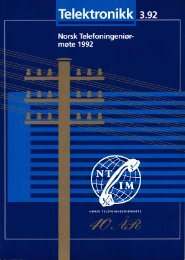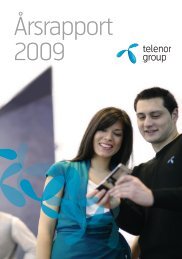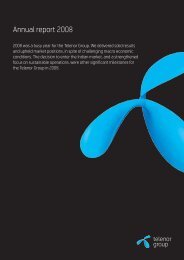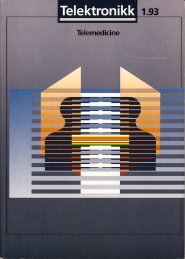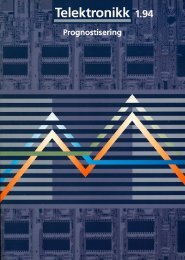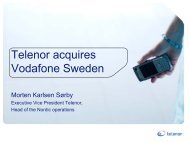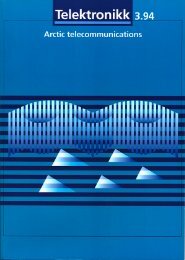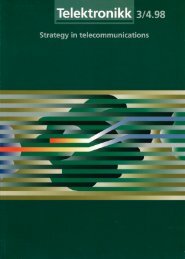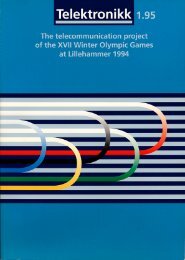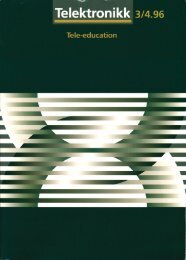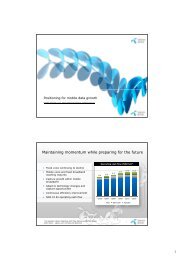You also want an ePaper? Increase the reach of your titles
YUMPU automatically turns print PDFs into web optimized ePapers that Google loves.
Anne Lise Lillebø (52) is Adviser<br />
to the Corporate Management of<br />
<strong>Telenor</strong>. Her main responsibilities<br />
include general and policy<br />
matters related to international<br />
organisations. She holds a Master<br />
of Arts degree from the University<br />
of Oslo.<br />
anne-lise.lillebo@telenor.com<br />
138<br />
WTSA 2000<br />
ANNE LISE LILLEBØ<br />
This article presents an overview of the major results of the ITU World Telecommunication<br />
Standardization Assembly (WTSA) in Montreal, 27 September – 6 October 2000.<br />
1 Introduction<br />
1.1 Tasks<br />
The World Telecommunication Standardization<br />
Assembly (WTSA) is held every four years by<br />
the International Telecommunication Union<br />
(ITU), a specialised agency of the United<br />
Nations, to define general policy for ITU’s<br />
Telecommunication Standardization Sector<br />
(ITU-T Sector). WTSA adopts the work programme,<br />
sets up the necessary Study Groups<br />
(SGs), designates chairmen and vice-chairmen<br />
of the Study Groups, reviews the working methods<br />
and approves Recommendations.<br />
The main issues of the WTSA in Montreal were:<br />
• Adoption of the ITU-T work programme and<br />
new structure of Study Groups;<br />
• Establishment of a new Special Study Group<br />
to deal with IMT-2000 and beyond;<br />
• Appointment of chairmen and vice-chairmen<br />
of the 14 Study Groups;<br />
• Working methods of the ITU-T, including the<br />
so-called Alternative Approval Process (AAP)<br />
or fast-track approval process;<br />
• ITU Reform;<br />
• Rights of Associates;<br />
• Cost sharing of international Internet connections.<br />
1.2 Participation<br />
The WTSA is open for participation both from<br />
Member States and Sector Members (operators<br />
and industry) of the T-Sector. <strong>Telenor</strong> is a Sector<br />
Member of the ITU-T and participated in its<br />
capacity as Sector Member, whereas Norway<br />
was represented by the Norwegian Post and<br />
Telecommunications Authority. A number of<br />
participants from Sector Members from other<br />
countries were included as members of their<br />
national delegations and did not represent their<br />
companies under their own names.<br />
1.3 WTSA Structure and<br />
Management<br />
WTSA was skilfully chaired by Mr. Mike Israel,<br />
Canada. The work was divided into seven committees:<br />
Committee 1 – Steering Committee<br />
Committee 2 – Budget control<br />
Committee 3 – Working methods of ITU-T<br />
Committee 4 – ITU-T Work Programme<br />
and Organization<br />
Committee 5 – Telecom Network<br />
Infrastructure<br />
Committee 6 – Telecom Services and<br />
Tariff Issues.<br />
The discussions in the committees were often<br />
dominated by the wish to obtain consensus<br />
instead of seeking the majority view. Consensus<br />
building is the normal way of work in a Study<br />
Group, but a WTSA could also seek a majority<br />
view in order to obtain results in a timely manner.<br />
Although Sector Members are very active in<br />
the work of the ITU-T Study Groups, the discussions<br />
at the WTSA were dominated by the Member<br />
States.<br />
1.4 Opening Speeches<br />
Mr. Yoshio Utsumi, ITU’s Secretary-General,<br />
gave a strong opening speech encouraging the<br />
WTSA delegates to take bold decisions on reform<br />
in order to maintain ITU-T’s position as a<br />
recognised world-wide standards body. ITU-T<br />
tries to streamline its working methods and<br />
image in order to speed up the development<br />
of global standards, to keep its present Sector<br />
Members and especially to attract new players<br />
in the IT field.<br />
1.5 European Preparations<br />
For the first time CEPT (“Conférence<br />
Européenne des Administrations des Postes et<br />
des Télécommunications” – a body of European<br />
policy-makers and regulators) had made co-ordinated<br />
preparations for the WTSA in co-operation<br />
with ETNO (European Public Telecommunications<br />
Network Operators’ Association – a trade<br />
association for European operators) and EICTA<br />
(European Information and Communications<br />
Telektronikk 1.2001



